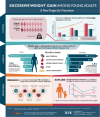The individual challenges, costs, and overall burden of the obesity epidemic continue to require new thinking. I have begun to see young adulthood as a neglected, yet critical, period of study in the development of obesity. Much of the success we’ve seen in obesity prevalence – the decline in 2-5 year-olds and the plateau in 6-11 year-olds – are likely due to interventions that target children, including school food changes through the Healthy Hunger Free Kids Act and specific changes to the milk and juice allowances in the Women, Infants and Children supplemental food program for mothers and young children (WIC).
Yet the doubling in obesity prevalence between the ages of 6-11 yearsand 20-39 years—from 17 to 34 percent—indicates that the transition from childhood to young adulthood is a critical window for obesity prevention and control efforts. Little is known about how the development of obesity in this age group may follow the multiple life transitions that occur during this time – including first jobs, newly independent living, childbearing and marriage.
Data from a recent article in the Journal of the American Medical Association by Zheng et al. point to excessive weight gain (≥ 20 kg, or ≥ 44 lbs) as not only common, but of particular concern during early adulthood. Viewed collectively with data from the NHANES follow-up (1971-84) and CARDIA (1985-96) studies, Zheng’s findings indicate that rates of excessive weight gain have increased in recent decades. The Zheng article also estimates the increased risks of serious chronic disease and premature death associated with excessive weight gain. Their data show unequivocally that weight gain in adulthood has serious morbidity and is associated with early mortality.
My editorial in JAMA that accompanied Zheng et al.’s article emphasized the need to explore and test family interventions for weight maintenance or weight loss. Pediatric weight loss interventions that take a whole family approach have demonstrated the added benefit of parental weight loss. With improved understanding of how major life transitions contribute to excessive weight gain during early adulthood, we may be able to achieve a double benefit – prevention of weight gain in young adult parents may prevent obesity in their children.
NEW: Infographic (PDF)- please share & send us feedback.
We are trying something new this month. Our STOP Obesity Alliance research assistant, Nichole Jannah, has created a one-page infographic that visually represents some of the key takeaways from the Zheng article and my accompanying editorial in JAMA. In our shared work to reverse the obesity epidemic and its consequences – for individuals, families and populations – effective communication of facts, trends, and opportunities continues to be essential. Please feel free to use this one-pager – with colleagues, patients, in presentations, on social media – and share your feedback. We welcome your thoughts on what is useful, how you use the infographic, and anything you might like to see changed. Please email us at obesity![]() gwu [dot] edu (subject: Feedback%20on%20STOP%20Infographic) (obesity[at]gwu[dot]edu). We look forward to hearing from you.
gwu [dot] edu (subject: Feedback%20on%20STOP%20Infographic) (obesity[at]gwu[dot]edu). We look forward to hearing from you.



